辽宁省东港市黑沟中学八年级英语下册 Unit 2 What should I do?(第3课时)学案
新目标八年级下册英语Unit2_What_should_I_do知识点

新目标人教版八年级下Unit2 What should I do 【重点词汇】1. play v. 播放2. loud adj. 高声的;大声的3. argue v. 争论,争吵4. wrong adj. 错误的;有毛病的;不适合的5. could v. can的过去式6. ticket n. 票,入场券7. surprise v. 使惊奇;使意外8. other adj. 任一的;(两方中的)每一方的9. except prep. 除;把……除外10. fail v. 失败11. football n. 足球12. until prep. 到……为止13. fit v. 适合,适应14. include v. 包括;包含15. send v. 发送,寄16. themselves pron.他们自己(反身代词)【重点词组】1. keep out不让……进入2. out of style不时髦的;过时的3. call sb. up打电话给……4. pay for付款5. ask for要求6. the same as与……同样的7. in style时髦的;流行的8. get on相处;进展9. as much as possible尽可能多10. all kinds of各种;许多11. on the one hand, ……(在)一方面,……12. on the other hand, ……另一方面,……【重点句型】1. What should I do?我应该怎么做?2. You could write him a letter.你可以写信给他。
3. What should he do?他应该怎么做?4. Maybe he should say he’s sorry.也许他应该说抱歉。
5. What should they do?他们应该怎么做?6. They shouldn’t argue.他们不应该争吵。
八年级下册Unit 2 What should I do-知识点归纳
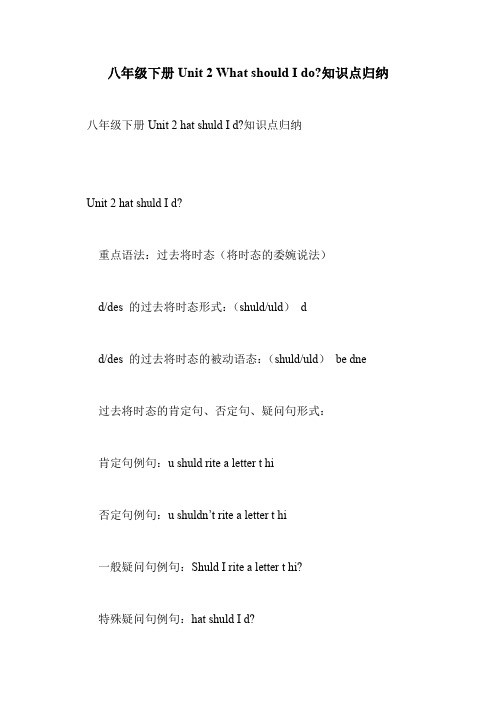
八年级下册Unit 2 What should I do?知识点归纳八年级下册Unit 2 hat shuld I d?知识点归纳Unit 2 hat shuld I d?重点语法:过去将时态(将时态的委婉说法)d/des 的过去将时态形式:(shuld/uld)dd/des 的过去将时态的被动语态:(shuld/uld)be dne过去将时态的肯定句、否定句、疑问句形式:肯定句例句:u shuld rite a letter t hi否定句例句:u shuldn’t rite a letter t hi一般疑问句例句:Shuld I rite a letter t hi?特殊疑问句例句:hat shuld I d?重点短语:eep sb ut 不让某人进入hat’s rng? = hat’s the atter? = hat’s the prble? 怎么了?ut f stle 不时髦的;过时的all sb up 给某人打电话pa fr sth 为某事付款part-tie b 兼职工作the sae as = be sae (t/ith)与……同样in stle 时髦的;流行的get n [ell] ith sb = get alng [ell] ith sb 与某人相处(好)didn’t = did ntuldn’t = uld ntas … as pssible 尽可能……(eg/ as sn as pssible 尽快)all inds f 各种;许多n the ne hand 一方面n the ther hand 另一方面as sb fr sth = as sb t d sth 请求某人做某事as sb nt t d sth 请求某人不要做某事spend (ne)n sth = spend (ne)[in] ding sth 花钱做某事sth st sb (ne)某人花钱为了某事tae sb setie t d sth 花某人时间做某事find ut 查明find sb ding sth 发现某人做某事be angr ith sb 生某人的气be angr at sth 生某事的气the sae age as = as ld as 与某人年龄一样have fight ith sb 与某人打架learn t d sth 学会做某事nt … until … 直到……才……pare sth(A)ith sth(B)把某事(A)与某事(B)作比较it’s tie fr sth = it’s tie t d sth 到该做某事的时间了abe adv 或许a be (情态动词+ 动词原形)可能是shall → shuld 情态动词shall 的原形和过去式pa → paid → paid 动词pa 的原形、过去式和过去分词Reading Strateg(阅读方法)u ill learn t use ne rds bette r if u use a learner’s ditinar (时刻学着应用新单词学习比时刻使用字典这种途径方法更好。
八年级下册Unit 2 What should I do-知识点归纳
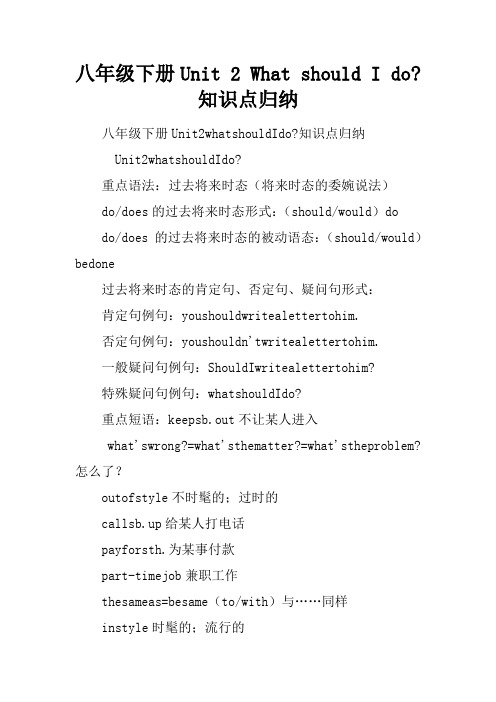
八年级下册Unit 2 What should I do?知识点归纳八年级下册Unit2whatshouldIdo?知识点归纳Unit2whatshouldIdo?重点语法:过去将来时态(将来时态的委婉说法)do/does的过去将来时态形式:(should/would)dodo/does的过去将来时态的被动语态:(should/would)bedone过去将来时态的肯定句、否定句、疑问句形式:肯定句例句:youshouldwritealettertohim.否定句例句:youshouldn'twritealettertohim.一般疑问句例句:ShouldIwritealettertohim?特殊疑问句例句:whatshouldIdo?重点短语:keepsb.out不让某人进入what'swrong?=what'sthematter?=what'stheproblem?怎么了?outofstyle不时髦的;过时的callsb.up给某人打电话payforsth.为某事付款part-timejob兼职工作thesameas=besame(to/with)与……同样instyle时髦的;流行的geton[well]withsb.=getalong[well]withsb.与某人相处(好)didn't=didnotcouldn't=couldnotas…aspossible尽可能……(eg/assoonaspossible尽快)allkindsof各种;许多ontheonehand一方面ontheotherhand另一方面asksb.forsth.=asksb.todosth.请求某人做某事asksb.nottodosth.请求某人不要做某事spend(money)onsth.=spend(money)[in]doingsth.花钱做某事sth.costsb.(money)某人花钱为了某事takesb.sometimetodosth.花某人时间做某事findout查明findsb.doingsth.发现某人做某事beangrywithsb.生某人的气beangryatsth.生某事的气thesameageas=asoldas与某人年龄一样havefightwithsb.与某人打架learntodosth.学会做某事not…until…直到……才……comparesth.(A)withsth.(B)把某事(A)与某事(B)作比较it'stimeforsth.=it'stimetodosth.到该做某事的时间了maybeadv.或许maybe(情态动词+动词原形)可能是shall→should情态动词shall的原形和过去式pay→paid→paid动词pay的原形、过去式和过去分词ReadingStrategy(阅读方法)youwilllearntousenewwordsbetterifyouusealearner'sdi ctionary.(时刻学着应用新单词来学习比时刻使用字典这种途径方法更好。
八下Unit2WhatshouldIdo
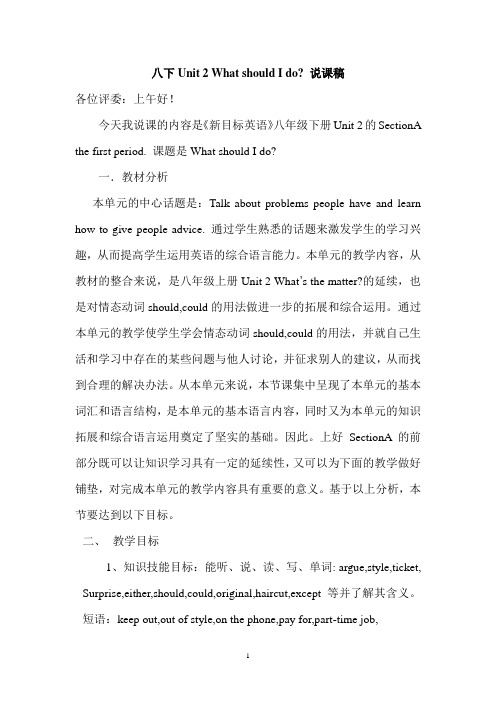
八下Unit 2 What should I do? 说课稿各位评委:上午好!今天我说课的内容是《新目标英语》八年级下册Unit 2的SectionA the first period. 课题是What should I do?一.教材分析本单元的中心话题是:Talk about problems people have and learn how to give people advice. 通过学生熟悉的话题来激发学生的学习兴趣,从而提高学生运用英语的综合语言能力。
本单元的教学内容,从教材的整合来说,是八年级上册Unit 2 What’s the matter?的延续,也是对情态动词should,could的用法做进一步的拓展和综合运用。
通过本单元的教学使学生学会情态动词should,could的用法,并就自己生活和学习中存在的某些问题与他人讨论,并征求别人的建议,从而找到合理的解决办法。
从本单元来说,本节课集中呈现了本单元的基本词汇和语言结构,是本单元的基本语言内容,同时又为本单元的知识拓展和综合语言运用奠定了坚实的基础。
因此。
上好SectionA 的前部分既可以让知识学习具有一定的延续性,又可以为下面的教学做好铺垫,对完成本单元的教学内容具有重要的意义。
基于以上分析,本节要达到以下目标。
二、教学目标1、知识技能目标:能听、说、读、写、单词: argue,style,ticket, Surprise,either,should,could,original,haircut,except等并了解其含义。
短语:keep out,out of style,on the phone,pay for,part-time job,The same as,in style,get on及句型:What’s wrong? What’s the matter? What should I do?2、过程方法:通过就自己的麻烦和问题,向他人征求建议,并能够为他人的问题找到合理的解决办法,提出相应的建议。
【Go for it】版八年级英语下册 Unit 2 What should I do? Secti
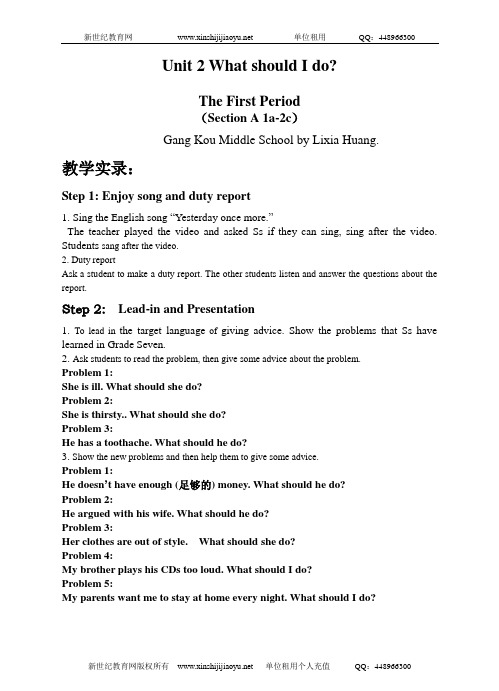
Unit 2 What should I do?The First Period(Section A 1a-2c)Gang Kou Middle School by Lixia Huang.教学实录:Step 1: Enjoy song and duty report1. Sing the English song “Yesterday once more.”The teacher played the video and asked Ss if they can sing, sing after the video. Students sang after the video.2. Duty reportAsk a student to make a duty report. The other students listen and answer the questions about the report.Step 2: Lead-in and Presentation1. To lead in the target language of giving advice. Show the problems that Ss have learned in Grade Seven.2. Ask students to read the problem, then give some advice about the problem.Problem 1:She is ill. What should she do?Problem 2:She is thirsty.. What should she do?Problem 3:He has a toothache. What should he do?3. Show the new problems and then help them to give some advice.Problem 1:He doesn’t have enough (足够的) money. What should he do?Problem 2:He argued with his wife. What should he do?Problem 3:Her clothes are out of style. What should she do?Problem 4:My brother plays his CDs too loud. What should I do?Problem 5:My parents want me to stay at home every night. What should I do?problemsHe doesn’t have enough money.He argued with his wife.Her clothes are out of style.My brother plays his CDs too loud.My parents want me to stay athome every night.Step 3 Guessing gameTell the Ss remember the problem, then show the pictures and ask Ss to say out the problems as quickly as they can.Students say out the problems as quickly as they can.Guessing gameHe doesn’t have enough money.He argued with his wife.Her clothes are out of style.My brother plays his CDs too loud.My parents want me to stay athome every night.Step 4 First listening1.Ask students to read the problems in activity 1a.2.Ask students to listen and circle the problems they hear in activity 1a.3.Listen again, and match the problems with the advice4.Let Ss have a pair-work. Two pairs act the conversation out.5.Sum up the sentence patterns of suggest and write them on the blackboardYou co uld … .Maybe you should … .I think you should … .(使…惊讶)give him a callphone him Step 6 Make a conversationAsk students to make a conversation according to the tips.Make a conversation•角色:Tina•情景:Tina 发现Tom 很不开心,Tom 碰到了一个问题.Tina 给Tom 提了一些建议。
八年级下册Unit 2 What should I do-知识点归纳

八年级下册Unit 2 hat shuld I d?知识点归纳八年级下册Unit2hatshuldId?知识点归纳Unit2hatshuldId?重点语法:过去将来时态(将来时态的委婉说法)d/des的过去将来时态形式:(shuld/uld)dd/des的过去将来时态的被动语态:(shuld/uld)bedne 过去将来时态的肯定句、否定句、疑问句形式:肯定句例句:ushuldritealetterthi否定句例句:ushuldn'tritealetterthi一般疑问句例句:ShuldIritealetterthi?特殊疑问句例句:hatshuldId?重点短语:eepsbut不让某人进入hat'srng?=hat'stheatter?=hat'stheprble?怎么了?utfstle不时髦的;过时的allsbup给某人打电话pafrsth为某事付款part-tieb兼职工作thesaeas=besae(t/ith)与……同样instle时髦的;流行的getn[ell]ithsb=getalng[ell]ithsb与某人相处(好)didn't=didntuldn't=uldntas…aspssible尽可能……(eg/assnaspssible尽快)allindsf各种;许多nthenehand一方面nthetherhand另一方面assbfrsth=assbtdsth请求某人做某事assbnttdsth请求某人不要做某事spend(ne)nsth=spend(ne)[in]dingsth花钱做某事sthstsb(ne)某人花钱为了某事taesbsetietdsth花某人时间做某事findut查明findsbdingsth发现某人做某事beangrithsb生某人的气beangratsth生某事的气thesaeageas=asldas与某人年龄一样havefightithsb与某人打架learntdsth学会做某事nt…until…直到……才……paresth(A)ithsth(B)把某事(A)与某事(B)作比较it'stiefrsth=it'stietdsth到该做某事的时间了abeadv或许abe(情态动词+动词原形)可能是shall→shuld情态动词shall的原形和过去式pa→paid→paid动词pa的原形、过去式和过去分词ReadingStrateg(阅读方法)uilllearntusenerdsbetterifuusealearner'sditinar (时刻学着应用新单词来学习比时刻使用字典这种途径方法更好。
人教版八年级英语下册unit2WhatshouldIdo

人教版八年级英语下册unit2 “ What should I do?”这个单元跟我们在八年级上册学习的关于对别人身体健康状况所提建议的句子是一样的,只不过在这个单元里,我们的学习范围扩大了,不仅仅是关于疾病的建议了,更多的是关于学习,生活和工作上所遇到的各种各样的困惑和麻烦,针对这些问题,给出合理的建议和使用什么样的句型比较好,这就是我们这节课所要学习的主要内容了。
在英语学习中,关于提建议的句型有很多,但在这个单元,我们主要是要掌握两个句型:“You should\shouldn’t …..”和“youcould\couldn’t….”主要是让学生用英语谈论自己的难题和向别人提建议,在引入方面我用猜测游戏的形式复习上册的关于疾病的问答,让几个学生轮流用表情表示不舒服,一个学生提问:What’s the matter? 各组学生竞猜,猜对后表演的学生问 What should I do?各组又举手抢答,表达正确加分在小组上。
接着先让学生结合自己的实际情况谈论学校和家庭中的种种麻烦和问题,例如: I argued with my best friend. I don’t have enough money .My math is poor 。
My clothes are out of style 等等.然后,我接着示范用should和could 来提建议,让学生去体会两种说法的区别,再让学生自己给有难题的同学提建议,为他人找到合理的解决办法,提出相应的建议及为自己的问题找到解决办法。
让学生使用“good idea”“okay idea”或“bad idea”表达对建议的看法。
接着,让学生练习情景对话,两人一组编对话,围绕问题,让学生给出Advice----具体用主题句:What should I do? / You could/ should/ shouldn’t….进行口语操练.然后再利用小组竞赛的方式让学生针对之前提出的难题提建议,比比谁提的建议最多,最好。
八年级英语下册Unit 2 What should I do- 知识讲解

八年级英语下册Unit 2 What should Ido? 知识讲解Unit2whatshouldIdo?【单元目标】1.单词与短语stereo,loud,argue,original,serious,style,wrong,argu ment,either,teen,talk,family,tutor,haircut,caller,e xcept,upset.wantsb.todosth. 2.playone’sstereo 3 stayathome4.arguewithsb/haveanargumentwithsb.5.beoutofstyle6.writesbaletter/writeto7.talkabout8.onthephone9.surprisesb.10.payfor 11.getapart-timejob 12.borrowsth.fromsb.13.asksb.for…14. haveabakesale 15.findout16.beupset17. call…up 18.thesameas9. getonwellwithsb.20. returnsth.21.haveafightwithsb.22.from…to…23. dropoff 24.preparefor25.after-schoolclubs26.beusedto27.fillup 28.takethemiddleroad2.目标句型:.whatshouldIdo?2.whydon’tyou…?3.youcould…4.youshould…5.youshouldn’t…3.语法情态动词的用法Ⅰ【重难点分析】情态动词Ⅰ*情态动词也可称为“情态助动词”,因为它和基本助动词都属于助动词类。
*情态动词和其他动词连用,可表示说话人的语气。
*情态动词可表达建议、要求、可能和意愿等。
*情态动词没有人称和数的变化。
*常用的情态动词有:can,could,may,might,must,shall,should,will,would这九大情态动词;其他的还有oughtto,need,dare等。
八年级下册Unit2WhatshouldIdo知识点归纳

八年级下册Unit 2 hat shuld I d?知识点归纳八年级下册Unit2hatshuldId?知识点归纳Unit2hatshuldId?重点语法:过去以后时态(以后时态的委婉说法)d/des的过去以后时态形式:(shuld/uld)dd/des的过去以后时态的被动语态:(shuld/uld)bedne 过去以后时态的确信句、否定句、疑问句形式:确信句例句:ushuldritealetterthi否定句例句:ushuldn'tritealetterthi一样疑问句例句:ShuldIritealetterthi?特殊疑问句例句:hatshuldId?重点短语:eepsbut不让某人进入hat'srng?=hat'stheatter?=hat'stheprble?怎么了?utfstle不时兴的;过时的allsbup给某人打pafrsth为某事付款part-tieb兼职工作thesaeas=besae(t/ith)与……一样instle时兴的;流行的getn[ell]ithsb=getalng[ell]ithsb与某人相处(好)didn't=didntuldn't=uldntas…aspssible尽可能……(eg/assnaspssible尽快)allindsf各类;许多nthenehand一方面nthetherhand另一方面assbfrsth=assbtdsth请求某人做某事assbnttdsth请求某人不要做某事spend(ne)nsth=spend(ne)[in]dingsth花钱做某事sthstsb(ne)某人花钱为了某事taesbsetietdsth花某人时刻做某事findut查明findsbdingsth发觉某人做某事beangrithsb生某人的气beangratsth生某事的气thesaeageas=asldas与某人年龄一样havefightithsb与某人打架learntdsth学会做某事nt…until…直到……才……paresth(A)ithsth(B)把某事(A)与某事(B)作比较it'stiefrsth=it'stietdsth到该做某事的时刻了abeadv或许abe(情态动词+动词原形)可能是shall→shuld情态动词shall的原形和过去式pa→paid→paid动词pa的原形、过去式和过去分词ReadingStrateg(阅读方式)uilllearntusenerdsbetterifuusealearner'sditinar(时刻学着应用新单词来学习比时刻利用字典这种途径方式更好。
八年级下学期 Unit 2 What should I do
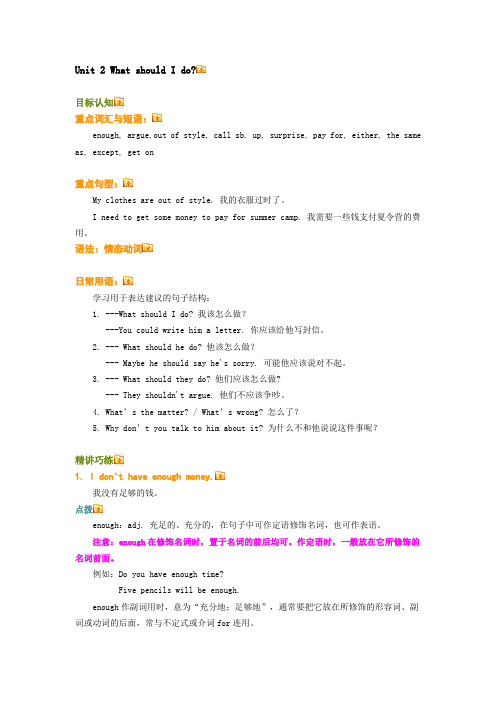
Unit 2 What should I do?目标认知重点词汇与短语:enough, argue,out of style, call sb. up, surprise, pay for, either, the same as, except, get on重点句型:My clothes are out of style. 我的衣服过时了。
I need to get some money to pay for summer camp. 我需要一些钱支付夏令营的费用。
语法:情态动词日常用语:学习用于表达建议的句子结构:1. ---What should I do? 我该怎么做?---You could write him a letter. 你应该给他写封信。
2. --- What should he do? 他该怎么做?--- Maybe he should say he's sorry. 可能他应该说对不起。
3. --- What should they do? 他们应该怎么做?--- They shouldn't argue. 他们不应该争吵。
4. What’s the matter? / What’s wrong? 怎么了?5. Why don’t you talk to him about it? 为什么不和他说说这件事呢?精讲巧练1. I don't have enough money.我没有足够的钱。
点拨enough:adj. 充足的、充分的,在句子中可作定语修饰名词,也可作表语。
注意:enough在修饰名词时,置于名词的前后均可。
作定语时,一般放在它所修饰的名词前面。
例如:Do you have enough time?Five pencils will be enough.enough作副词用时,意为“充分地;足够地”,通常要把它放在所修饰的形容词、副词或动词的后面,常与不定式或介词for连用。
八(下)Unit2 what I should I do 精品教学资料包(精品课件+精品导学案+精品
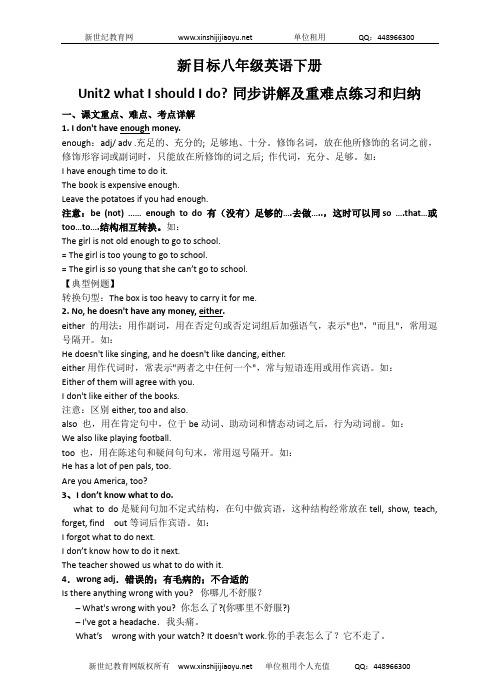
新目标八年级英语下册Unit2 what I should I do?同步讲解及重难点练习和归纳一、课文重点、难点、考点详解1. I don't have enough money.enough:adj/ adv .充足的、充分的; 足够地、十分。
修饰名词,放在他所修饰的名词之前,修饰形容词或副词时,只能放在所修饰的词之后; 作代词,充分、足够。
如:I have enough time to do it.The book is expensive enough.Leave the potatoes if you had enough.注意:be (not) ……enough to do 有(没有)足够的….去做…..,这时可以同so ….that…或too…to….结构相互转换。
如:The girl is not old enough to go to school.= The girl is too young to go to school.= The girl is so young that she can’t go to school.【典型例题】转换句型:The box is too heavy to carry it for me.2. No, he doesn't have any money, either.either的用法:用作副词,用在否定句或否定词组后加强语气,表示"也","而且",常用逗号隔开。
如:He doesn't like singing, and he doesn't like dancing, either.either用作代词时,常表示"两者之中任何一个",常与短语连用或用作宾语。
如:Either of them will agree with you.I don't like either of the books.注意:区别either, too and also.also 也,用在肯定句中,位于be动词、助动词和情态动词之后,行为动词前。
新目标八年级英语下册Unit2《What should I do》教学设计

八年级下册新目标英语Unit2《What should I do》教学设计课程名称《Section A 1a-2b 》授课人李妍学校名称陆川县米场镇福达中学教学对象八年级科目英语课时安排1课时一、教材分析本课是unit2的第一课,以“what should I do?”为中心话题。
学会向别人寻求意见及为别人提出意见并以此开展一系列的听、说、读、写等教学活动,进一步提高学生综合运用语言的能力。
本课以素质教育为目的,结合教材重点、难点及英语学科特点,利用多媒体辅助教学。
从听、说、读、写等方面使学生得到训练,在愉快、轻松的氛围中温故而知新,达到初步运用英语交际的能力。
教学中我运用了多媒体课件,来帮助学生创设英语的语言环境,使学生能够置身于真实的语言环境中去学习语言。
首先,我利用跟读单词来让学生熟悉本节课所需要用到及掌握的单词。
然后通过复习前面几个单元所学的知识导入新课,引起有意注意,同时引出本课的重点“you should …”。
在看、听、说、练的过程中掌握此句型。
本课采用实践性强、任务明确的“任务型”语言教学( task—based language teaching and learning ) , 即在教师指导下, 让学生带着明确的任务目标,在感知、体验、实践、参与、合作的活动中, 积极主动地进行学习。
利用多媒体课件中的图片展示,让学生学会看图描述正在发生的动作。
让学生将所学的知识运用到实际生活中。
多媒体课件的使用超越了时间和空间的限制,将书本知识还原为实际生活经验,将抽象的知识具化为与学生生活实际相关、学生感兴趣的话题,使学生通过思考、调查、讨论、交流和合作等方式学习和使用英语, 完成学习任务。
二、教学目标及难重点(知识与技能,方法和过程,情感态度与价值观)教学目标:根据新课程标准的理念,学生的学习目标应将知识与能力、过程与方法、情感态度与价值观这三方面融为一体。
因此,我将本节课的教学目标制定如下:1.语言目标:词汇:play, argue, wrong, style, out of style, could, call sb.up, ticket, surprise, keep out, on the phone. What’s wrong? What’s the matter?。
八年级英语下册Unit2WhatshouldIdoPeriod1教案人教新目标版
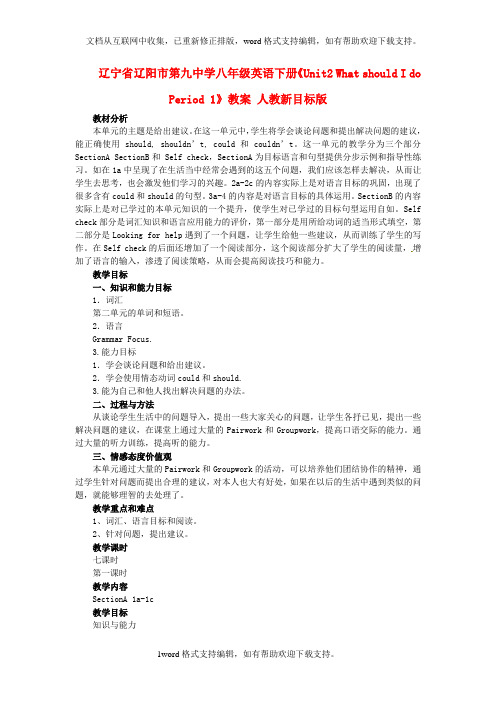
辽宁省辽阳市第九中学八年级英语下册《Unit2 What should I doPeriod 1》教案人教新目标版教材分析本单元的主题是给出建议。
在这一单元中,学生将学会谈论问题和提出解决问题的建议,能正确使用should, shouldn’t, could和couldn’t。
这一单元的教学分为三个部分SectionA SectionB和 Self check,SectionA为目标语言和句型提供分步示例和指导性练习。
如在1a中呈现了在生活当中经常会遇到的这五个问题,我们应该怎样去解决,从而让学生去思考,也会激发他们学习的兴趣。
2a-2c的内容实际上是对语言目标的巩固,出现了很多含有could和should的句型。
3a-4的内容是对语言目标的具体运用。
SectionB的内容实际上是对已学过的本单元知识的一个提升,使学生对已学过的目标句型运用自如。
Self check部分是词汇知识和语言应用能力的评价,第一部分是用所给动词的适当形式填空,第二部分是Looking for help遇到了一个问题,让学生给他一些建议,从而训练了学生的写作。
在Self check的后面还增加了一个阅读部分,这个阅读部分扩大了学生的阅读量,增加了语言的输入,渗透了阅读策略,从而会提高阅读技巧和能力。
教学目标一、知识和能力目标1.词汇第二单元的单词和短语。
2.语言Grammar Focus.3.能力目标1.学会谈论问题和给出建议。
2.学会使用情态动词could和should.3.能为自己和他人找出解决问题的办法。
二、过程与方法从谈论学生生活中的问题导入,提出一些大家关心的问题,让学生各抒已见,提出一些解决问题的建议,在课堂上通过大量的Pairwork和Groupwork,提高口语交际的能力。
通过大量的听力训练,提高听的能力。
三、情感态度价值观本单元通过大量的Pairwork和Groupwork的活动,可以培养他们团结协作的精神,通过学生针对问题而提出合理的建议,对本人也大有好处,如果在以后的生活中遇到类似的问题,就能够理智的去处理了。
新课标人教版八年级英语下册Unit 2 What should I do(1)

Unit 2 What should I do(1)单元教材分析学会should ,Why don’t you和could在英语中的习惯用法。
使用这些习惯用法,就自己生活、学习中存在的某些实际问题提出建议;拒绝、接受别人的建议。
在学习贴近学生生活实际的语言知识的同时,特别关注学生生活和学习中的真实困难和烦恼。
进一步引导学生对自我和周围世界进行比较客观的认识、评价,发展学生主动解决问题的自我意识和行为能力。
发展学生与人和谐交往的能力;培养在学生交流中寻求帮助。
既坚持自己观点、又听取别人建议。
单元总体目标1. The students will learn to talk about problems.2. The students can help people in trouble and how to give advice.3. Practice the sentences with “could, couldn’t, shouldn’t”.4. To learn the words and expressions about reading passage.单元重难点一览单元学情分析In this unit students learn to talk about problems and give advice. First make up a problem you might be having and write you could do about it. Secondly read the problem to the class again and help the class give advice using the words could, should, shouldn’t. In the end, make sentences with the words and write some letters or make conversations.单元教学建议Ask the students to read papers or magazines to find some problems the people have, then ask the students to make a chart with each problem. Ask some students to write a paragraph about the worst advice they ever got, and guess what the problem is. Maybe ask three or five students to work in group for a radio talk show where people call in for advice.单元课时分配Five periods第一课时教学内容1. To learn the words and expressions about this period.2.To talk about the problems serious or not for them in daily life.3.To learn how to describe the problems you have or how to help others to give him orher some advice.教学目标知识与能力1. Knowledge aims: Words and expressions; How to use should, could, shouldn’t;2. Ability aims: Express the good ideas to solve the problems;Help others when they are in trouble.过程与方法首先谈论生活中严肃或不严肃的事情;通过听力训练和口语表达学会如何表达自己的困难,如何给别人提建议等;通过谈论表达自己对有些困难的理解,提出个人不同的建议。
whatshouldIdo?
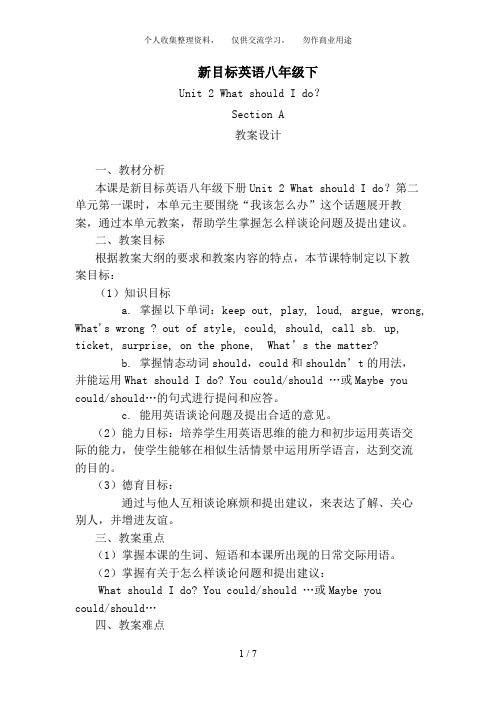
新目标英语八年级下Unit 2 What should I do?Section A教案设计一、教材分析本课是新目标英语八年级下册Unit 2 What should I do?第二单元第一课时,本单元主要围绕“我该怎么办”这个话题展开教案,通过本单元教案,帮助学生掌握怎么样谈论问题及提出建议。
二、教案目标根据教案大纲的要求和教案内容的特点,本节课特制定以下教案目标:(1)知识目标a. 掌握以下单词:keep out, play, loud, argue, wrong, What's wrong ? out of style, could, should, call sb. up, ticket, surprise, on the phone, What’s the matter?b. 掌握情态动词should,could和shouldn’t的用法,并能运用What should I do? You could/should …或Maybe you could/should…的句式进行提问和应答。
c. 能用英语谈论问题及提出合适的意见。
(2)能力目标:培养学生用英语思维的能力和初步运用英语交际的能力,使学生能够在相似生活情景中运用所学语言,达到交流的目的。
(3)德育目标:通过与他人互相谈论麻烦和提出建议,来表达了解、关心别人,并增进友谊。
三、教案重点(1)掌握本课的生词、短语和本课所出现的日常交际用语。
(2)掌握有关于怎么样谈论问题和提出建议:What should I do? You could/should …或Maybe youcould/should…四、教案难点(1)谈论问题: What’s wrong? / What’s the matter? / Wh at’s your trouble?(2)给出建议: should, shouldn’t, could, why don’t yo u...?, Why not?五、教案方法在进行具体教案时,教案方法不是固定不变的,教案方法具有灵活性、多样性、发展性和补偿性,选择和采用教案方法,不仅要依据学科的知识特点,而且要根据教案任务和学生的年龄特点及学生的实际水平选用。
- 1、下载文档前请自行甄别文档内容的完整性,平台不提供额外的编辑、内容补充、找答案等附加服务。
- 2、"仅部分预览"的文档,不可在线预览部分如存在完整性等问题,可反馈申请退款(可完整预览的文档不适用该条件!)。
- 3、如文档侵犯您的权益,请联系客服反馈,我们会尽快为您处理(人工客服工作时间:9:00-18:30)。
Unit 2 What should I do?(第3课时)
【学习目标】
1.初步了解英美等西方国家的学生在学习和生活中遇到的主要问题与烦恼,以及获取帮助的渠道。
2.通过共同探讨、解决各种烦恼和困惑,学会反思自我,体谅他人,增强合作意识,培养积极乐观的情感态度;发展人际交往能力以及在实际生活中分析问题、解决问题的能力。
3.听力技能提高。
【重点、难点】
【自主互助学习】
温故知新小组准备补全下面的对话复习上节内容:
A:I need some money to buy a book. What should I do?
B: ______________________.
A: No, I don’t like to ask my parents for money.
B: I think you could ___________________ job.
A: ________. Thank you.
一、小组合作
1.词语学习,翻译下列单词和短语。
1)新颖的__________________ 2)不贵的__________________
3)和….相同_______________ 4)时尚的__________________
5)过时的__________________ 6)和…不同_________________
2.探究句式:探究画线部分的用法
I’m very upset and don’t kn ow what to do.
例句:Could you tell me how I can get to the library.( how to get to )
Could you tell me how to get to the library.
The problem is where I can put the desk.
___________________________________________________
He wasn’t sure who he should help.
__________________________________________________
3.翻译下列句子
1)我的朋友有比我好看的衣服。
___________________________________________________
2)我的朋友穿着与我同样的衣服,梳着与我同样的发型
____________________________________________________
4.小组讨论挑选衣服的重要因素,完成1a/1b 。
二、听力技能提高
1.认真听录音,选出Erin’s problem .
2.再听一遍完成2b 。
3.听力训练,听并复述关键句型。
三、综合训练
为Erin提出自己的建议。
【课堂练习】
一、完成句子
1. Lucy ___________ (一样年龄), because we’re twins.
2. We’re ____________ (互相之间相处得好) in school.
3. You shouldn’t always ______________ (向别人借钱).
4. You shouldn’t ______________ (把钢笔借给别人) during the test.
5. She d oesn’t know _____________ (下一步该怎么做).
【要点归纳】
掌握句型:My friend is more popular than me.
You could be more friendly. You should try to be funny.
【拓展练习】
一、单项选择
()1. The young man often _____ his CDs too loud in the evening.
A. plays
B. played
C. will play
D. play
()2. She said she _____ enough money for summer camp.
A. hasn’t
B. didn’t have
C. doesn’t have
D. won’t have
()3. She shouldn’t _____ her mother because her co at is out of style.
A. h ave a fight with
B. argue with
C. have talk with
D. A &
B
()4. —Look! Linda’s new hat looks so cool!
—Yeah. And it’s _____ style, too.
A. on
B. with
C. in
D. out of
()5. —What’s _____, Bill? —I’ve a fight with my brother.
A. wrong
B. the matter
C. your trouble
D. Both A, B & C
()6. Look! She _____ our new teacher.
A. probably
B. possible
C. may be
D. maybe
()7. You shouldn’t _____ at night. She may feel ups et.
A. call her up
B. call up her
C. ring up her
D. call she
()8. You could buy him two tickets _____ a theater.
A. of
B. to
C. for
D. in
()9. She doesn’t like to talk about such a problem _____.
A. by a phone
B. by the phone
C. on phone
D. on the phone。
